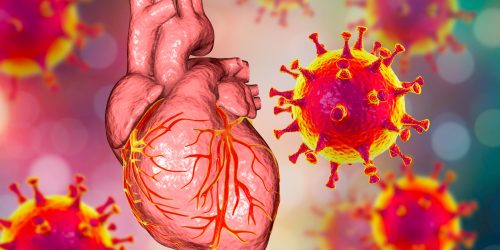
Myocarditis. We’ve heard this condition thrown around a lot recently. It’s been brought up in discussions of COVID-19, COVID vaccines and so on. It’s a heart condition you may not have heard of previously. So, what is it? Did it exist before COVID? And what is its relationship with COVID-19.
We decided to delve a little bit more into this condition to share some facts, break some myths and share with you the insight from the head of cardiology at Royal North Shore hospital, Professor Ravi Bhindi.
Professor Ravi Bhindi is a consultant and Interventional Cardiologist at Royal North Shore Hospital with an expertise in complex coronary intervention and structural heart disease including percutaneous valve therapies. He is Head of Clinical Trials and the Structural Heart disease at North Shore Private and Royal North Shore Hospitals.
In addition to an active clinical role, he maintains active research programs and has over 100 publications in peer reviewed journals and has been researching the impact of COVID-19 on the heart since the pandemic commenced.

What actually is Myocarditis and who is generally affected by it?
Myocarditis is an inflammatory disease of the heart muscle, which may be caused by infectious and non-infectious conditions. This inflammation may enlarge and weaken the heart, create scar tissue, and force the heart muscle to work harder to circulate adequate amounts of blood and oxygen throughout the body.
Whilst Myocarditis may occur in any age group, it most commonly affects individuals from puberty through their early 30’s. It is up to twice as likely to occur in men compared to women, and may even affect young, athletic and otherwise healthy individuals.
How does Myocarditis differ from Pericarditis and Endocarditis?
Whilst all 3 conditions relate to inflammation of the heart; each condition corresponds to a specific layer in its structure.
The heart is made up of three layers:
The Pericardium is the outermost layer of the heart. It is a sac of connective tissue and serous membranes that cushion and protect the heart. Pericarditis relates to inflammation of this layer, and may even lead to fluid build up around the heart which may impair cardiac function.
The Myocardium is the middle muscular layer of the heart which relaxes and contracts enabling the heart to pump blood around the body. Myocarditis refers to inflammation of this layer, which may often lead to enlargement and weakening of the heart muscle. Over time, the inflammatory injury may cause scar tissue which forces the heart to work harder to circulate blood and oxygen throughout the body.
The Endocardium is the innermost layer of the heart made up of thin, smooth tissue that makes up the lining of the chambers and valves of the heart. Its role is to direct blood through the heart and protect the valves and chambers, so endocarditis,can also have serious implications.
What are the symptoms of Myocarditis?
Like many different heart conditions, it can be challenging to diagnose myocarditis due to a lack of specific symptoms. Some individuals may present with no symptoms at all, others may point back to the index viral infection, and when symptoms do present, they could mimic other cardiac problems such as a heart attack. This can lead to a delay in accurate diagnosis and therefore treatment. Myocarditis is generally diagnosed by a combination of blood tests, ECG, chest X-Ray, as well as specific imaging techniques such as an echocardiogram or cardiac MRI, which may not readily be available in an emergency department.
Some symptoms of myocarditis can include, but are not limited to:
- Shortness of breath, especially after exercise or when lying down
- Fatigue
- Heart palpitations
- Chest pain or pressure
- Lightheadedness or fainting
- Lower limb swelling
If any of these symptoms are detected, as always, it is important to speak to your doctor immediately.
Does COVID-19 cause Myocarditis?
Viral infections are the most common cause of myocarditis, either due to direct viral injury, or via a systemic inflammatory response – and this includes COVID-19. So yes, COVID-19 may cause myocarditis, but as can many other common viral infections.
We’ve heard a lot about Myocarditis and Pericarditis in the media associated with the COVID-19 vaccine. Can the COVID-19 vaccine cause these conditions?
As always, it’s important to refer the most up-to-date literature shared by The Australian Government Department of Health, and The Australian Technical Advisory Group on Immunisation (ATAGI), as our understanding of this topic continues to grow. Currently, the advice states that “rarely, cases of myocarditis and pericarditis have been reported after the second dose of mRNA vaccine. It is particularly seen in males under 30 years old. Most cases are mild and patients have recovered quickly.”
For more information click here
So, yes, we have seen an association of COVID-19 vaccinations, particularly with mRNA-based Pfizer and Moderna vaccines. But given the infrequency and mild nature of the myocarditis and pericarditis cases, the small risks are easily outweighed by the protective benefits of the vaccine, such as reducing the severity of a COVID-19 infection, which can have a much more damaging long-term effect on the heart.
For more information, the publication Professor Bhindi and his team have conducted highlighting the incidence of cardiac complications after COVID-19 in Australia is available here.
For information on research to improve diagnosis and detection of Myocarditis, click here.
